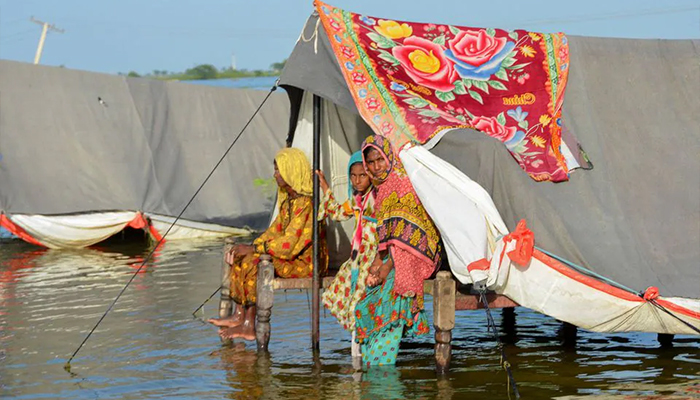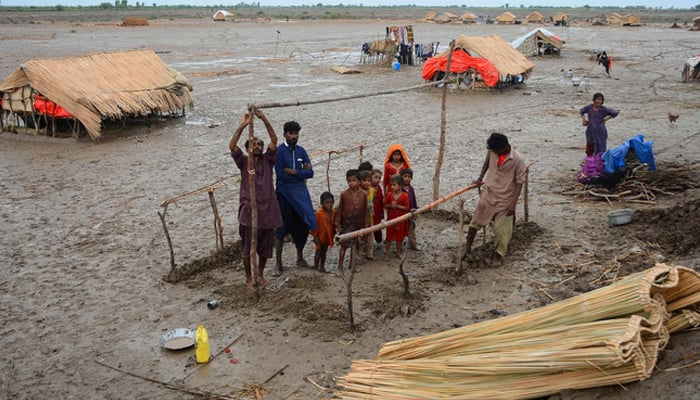Who is responsible for climate refugees? Part – II
Innocents lose everything because of foolishness of extravagant lifestyles that cost lives of millions
December 26, 2023

Tuvalu, Kiribati, and the Maldives have been suffering from the devastating impact of climate change. Experts predict that these countries will be underwater in 2050.
Internal displacement is not possible for them since the entire land is in threat of being swallowed by water. The importance of the matter can be proved by Tuvalu’s government considering a lawsuit against Australia and the United States for their contribution to climate change. Subsequently, it is a low-lying nation in the world and is most susceptible to climate effects even though its contribution to greenhouse emissions is insignificant compared to these two wealthy nations. Given that most Tuvaluans live on the coastline, sea-level rises and storm surges would have dramatic effects on its population of 10,050 inhabitants.

Rich countries had promised to give $100 billion every year to developing countries suffering from climate change. However, the lawyer representing Tuvalu and two other countries described the amount as “grossly inadequate”. It was demanded that compensation for Babuda being obliterated by a hurricane in 2017 is nearly impossible. Antigua, Barbuda and Tuvalu are aiming towards taking action by taking matters to judiciary bodies like the UN’s International Tribunal Law of the Sea. Countries threatened the most by the emergence of climate refugees hold wealthy nations accountable and demand justice from them since they believe they are the ones who caused it.
‘Efforts’ by the guilty can be seen too. The US president has set impossible goals which they have not met as of yet. A survey carried out by Pew Research concluded that two-thirds of Americans believe that the government is not doing much to meet these aims. They want policies for tree planting efforts, tax credits for businesses that add to carbon emissions, and tougher fuel standards for transport. However, the White House has claimed that the Biden administration introduced policies on February 15, 2022, which aim to make steel, concrete etc in a net zero carbon emissions method through the set investment of $9.5 billion towards hydrogen boost production which helps decarbonise products. Policies do tip towards promoting environmentally friendly products, but implementation is yet to be observed. Until a change is observed, letting go of the damage caused by such nations is unfair.
Contributions on an individual level must be considered too. Fossil fuel companies are said to be accountable for a third of carbon emissions, with 20 companies alone responsible. Furthermore, an investigation by ‘Inside Climate News’ revealed that oil firms like Exxon are aware of their contribution to climate change and knowingly take steps to cut off all efforts to reduce emissions.
Amy Westervelt, climate change activist, reported to BBC that these companies extract and burn fossil fuels – “no matter the cost”. Rex Tillerson, executive chief of Exxon, argued that “cutting oil use to fight climate change would make poverty reduction harder”. Science and climate change-related data is attacked and disregarded by these companies and labelled false. Concepts like ‘carbon footprint’ are used as arguments by them, claiming that the individual demand for rich goods is the problem.
Rich people across 86 countries are known to, due to their extravagant lifestyles, devour 20 times more of the energy taken by the poorest. The rich can afford a lifestyle that includes luxury products which require a huge amount of energy consumption. These people also hold the power to influence government decisions allowing policies to be favourable towards fossil fuel-burning companies that produce products that interest the rich. The reason behind the consumption may be linked to a system that appreciates the use of money on such goods. On the other hand, taxing locals on the use of basic home energy is pointless, and cutting the demand for goods is impossible. Thus, leaning more towards renewable energy and energy efficiency would serve better the cause of cutting carbon emissions.
The first important course of action would be to recognize climate refugees, and while doing so every country must establish policies on a local and national level that focus on ways to deal with the resettlement of refugees. This can be obtained by the UN encouraging a set definition and detailed solution-oriented policies. Seminars for locals, educating them about climate change and their contributions should be held by the government. They can also discourage the use of power plants which emit a high amount of carbon dioxide and introduce carbon taxes. Countries with the highest CO2 emissions should see it as a duty to take responsibility for the expense required to aid in the establishment of shelters and help tackle the damage.
Initially, I believed that a handful of countries alone are responsible, and their governments are to be held accountable. Through research, I realised that the rich countries are the ones that hold the reins. Their demands push factories to exploit the environment and allow climate change to bring climate refugees.
The lack of strong and successive policies regarding climate refugees shows the lack of awareness and will towards the subject. The emergence of climate refugees began because of us. It is on us to give up some luxury to provide safety to victims. Policies or laws will not make a change unless we change individually. Industrial projects that lead to natural disasters all over the world are supported by our demand for the product. Innocents lose everything because of the foolishness of extravagant lifestyles that cost the lives of millions. If communities fail to accept their roles, they will risk the prosperity of their future generation.
The writer is a student and was part of Harvard’s Journalism Academy in 2022.
Disclaimer: The viewpoints expressed in this piece are the writer's own and don't necessarily reflect Geo.tv's editorial policy.
Originally published in The News











